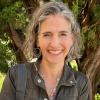
Lise Sanders 90F

Lise Sanders 90F received her B.A. in literature from Hampshire College and her M.A. and Ph.D. in English language and Literature from the University of Chicago.
Sanders works on 19th- and 20th-century British literature, print media and periodical culture, fashion studies, film studies, early film history, feminist theory, women’s history, and gender studies.
Her current book project, Working Women and Popular Culture in Britain, 1910s-1930s: Redressing the Romance, focuses on early 20th-century magazines for girls and young women, intermedial fictions by Elinor Glyn and E.M. Hull, and writings by and about working-class women addressing women’s sexual and political agency in the interwar period.
Her books include Consuming Fantasies: Labor, Leisure, and the London Shopgirl, 1880-1920 (Ohio State University Press, 2006); Bodies and Lives in Victorian England: Science, Sexuality, and the Affliction of Being Female, co-authored with Pamela K. Stone (Routledge, 2020); Embodied Utopias: Gender, Social Change, and the Modern Metropolis, co-edited with Amy Bingaman and Rebecca Zorach (Routledge, 2002); and a critical edition of Millicent Garrett Fawcett’s 1875 novel Janet Doncaster (Victorian Secrets, 2017). With Susanne Schmid, she co-edited a collection of primary sources on shops and department stores entitled Temples of Luxury (Routledge, 2024). She has co-edited special journal issues on fashion with Ilya Parkins (The Journal of Modern Periodical Studies and Feminist Theory) and on women’s writing and social/political activism with Carey Snyder (Women: A Cultural Review). Her articles on Victorian feminism, literature, and early cinema have appeared in Early Popular Visual Culture, The Journal of Modern Periodical Studies, Modern Fiction Studies, Women’s History Review, and several edited collections.
Sanders has taught at Amherst and Smith College and has advised master’s and doctoral students at the University of Massachusetts Amherst. She serves on the board of directors of The Massachusetts Review and is a member of the Feminist Theory editorial collective.
Recent and Upcoming Courses
-
What kinds of stories can we tell from archives? What stories do archives themselves tell? Cultural historians and cultural critics often rely on archives and special collections, which contain materials like letters, journals, manuscripts, organizational records, oral histories, photographs, periodicals, and ephemera. Creative writers, artists, and filmmakers can draw upon archives to shape their work as well. In this research- and writing-intensive seminar, students will have the opportunity to develop independent projects in the humanities, arts, media and cultural studies, using archival materials as the foundation for their work. During the first half of the semester, we will visit local archives and special collections at Hampshire, Amherst, Mount Holyoke, Smith, UMass, and the Emily Dickinson Museum, using scholarly sources to develop critical and methodological tools for archival practice. The second half of the semester will focus on the process of developing a substantial independent research project in stages. Peer review workshops will be a key component of the course, complemented by library research sessions and instruction in effective argumentation. Students interested in creative final projects in writing, film and photography, media, and other areas relevant to research in humanities and cultural studies are welcome, as well as students pursuing divisional work in literary studies, film and visual culture, and related areas. While students need not have previous background in archival research, they should have a working knowledge of the field in which they will conduct independent research. This course meets the Division II Supported Projects Requirement. Keywords: archives, independent projects, research, creative practice
-
This course is designed to introduce students to key issues in film studies, focusing on cinema in a global and historical framework. We will pay particular attention to discourses of racial identity, gender difference, and sexuality on screen, reading early, classical, and recent films in the context of contemporary conversations about politics, equity, and social justice. The course will highlight the history of filmmaking by women, LGBTQ+ and BIPOC filmmakers (including Dorothy Arzner, Julie Dash, Maya Deren, Ava DuVernay, Todd Haynes, Sky Hopinka, Barry Jenkins, Oscar Micheaux, Jordan Peele, and Celine Sciamma, among others) in an effort to critique and expand the film studies canon. Regular short writing assignments and in-class discussions will address how to interpret film on the formal/stylistic level (sequence analysis, close reading, visual language) as well as in the context of major trends and figures in film history Keywords:Film studies, race, gender, sexuality, social justice


